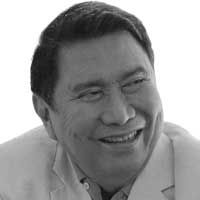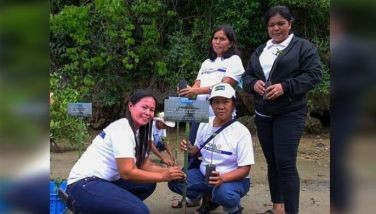Poverty, injustice, insurgency

Jose Maria Sison, the founder of the Communist Party of the Philippines (CPP), died while in self-exile in the Netherlands.
Obviously alone with his wife, the man whose revolutionary ideals are followed by numerous youths died a lonely man.
Many may disagree with Sison on his utopian preaching of equality for all, but they certainly admired him for upholding his principles.
Communism is a pipe dream because, to quote writer George Orwell, “some are more equal than others.”
To paraphrase former senator Orly Mercado, who was a revolutionary in his youth, the young tend to be idealistic and lean towards the concept of changing society through violent means, but when they get older, they become wiser and more practical.
Individuals like Sison and Che Guevarra make governments examine what’s wrong in their societies. These people may be wrong, but they make governments introspective by jolting countries with insurgency problems.
The Philippines has the longest armed communist insurgency in Asia, spanning 53 years.
Indonesia and Malaysia have, in general, eliminated their armed insurgency problems many years ago.
As long as poverty and injustice plague the Philippines, our insurgency problems will continue to fester.
Poverty causes injustice because the poor in our society are always at the receiving end of oppression by the high and mighty.
A classic example is when poor suspects experience police brutality, which does not happen to the rich and influential.
More likely than not, the courts will acquit the rich and powerful and send the poor to jail, even if the latter are innocent.
If our government eliminates poverty, the insurgency problem will disappear.
* * *
We seem to be a doomed society. This county not only has a long-running communist insurgency, but it also has a Moro rebellion!
Even if we’re able to tackle the communist insurgency by eliminating or minimizing poverty, the Moro rebellion will keep on going.
Why? It’s a problem of disparity between religions and cultures.
I once asked a Muslim friend what made his people continue to defy the government, even if it’s trying very hard to pacify our Muslim brothers and sisters.
His answer astounded me. If memory serves, he said, “Because you Filipinos sided with the Spaniards during the Spanish colonial period.”
Do note his use of the word “Filipino” to identify non-Muslims.
It seems uneducated Muslims don’t consider themselves a part of the country. The conflict in Mindanao, which is about religion, will be with us for a long time.
* * *
The Muslim rebellion has prevented the economic growth of Mindanao, the country’s second-biggest island; Luzon is the largest in the archipelago.
Our Muslim brothers continue to defy the government in Manila, from the Spanish colonial period to the American era, to the short Japanese occupation until the present time.
Before the full-blown war in Mindanao in the 1970s, the defiance consisted of banditry and outlawry.
I was a little boy when my father was assigned to several areas in Sulu as a lieutenant in the defunct Philippine Constabulary, the forerunner of the Philippine National Police.
I remember Indanan, Seit Lake and Luuk, my father’s places of assignment.
I remember the night patrols of my father and his men and the sounds of gunfire near the PC camp in Indanan. I recall dad rushing home from his office to get his carbine and lead his troops to the source of gunfire. This was in the 1950s.
I remember our convoy – led by a scout car with a .50-caliber machine gun, a .30-caliber machine gun in the back; a weapons carrier full of uniformed soldiers; the jeep with Dad, Mom and we children in it; and a six-by-six truck full of soldiers’ dependents – being flagged down by informers and cautioned about the presence of armed bandits around the bend.
It was as if it happened yesterday. I remember all the soldiers’ dependents – wives and children – being asked to dismount and lie prone on the roadside while my dad and his men moved slowly in their vehicles, and later hearing the sounds of gunfire.
The loudest sound was the fearsome pop-pop-pop from the .50-caliber. In the end, there was silence.
Two would-be ambushers were killed in the firefight; none died on my father’s side.
* * *
Do you see how the proper use of intelligence funds saved the convoy from being ambushed?
The informers who warned the convoy of an impending ambush were financially supported by my father, who also gave them arms to go against their fellow outlaws.
My father described them as “friendly outlaws.”
* * *
The fiercest and most fearless tribe among Filipino Muslims is the Tausug of Sulu.
The Tausugs are warriors. It is said that a Tausug loves his barong (machete) or gun more than he loves his wife or wives.
A Tausug’s idea of adventure is to look for an enemy. His enemy could be a member of a different clan, a fellow Tausug who had wronged him or government soldiers.
In the late 1940s and early ’50s when my father was in Sulu, magsabil (go on a killing rampage) was rampant among the Tausugs.
A juramentado, one who decides to go on a killing rampage against Christians, would pray the whole night to cleanse himself of his “sins.”
After that, the religious fanatic would hack the stairs to his hut to signify that he would not be coming home.
An old religious belief among Filipino Muslims is that if they killed many Christians, they would ride a white horse to heaven, where 72 virgins were waiting for them.
Apparently, this belief started during the conflicts between Mohammedans and Christians, which the latter called the Crusades.
The bad blood between Christians and Muslims continues to this day.
- Latest
- Trending


























